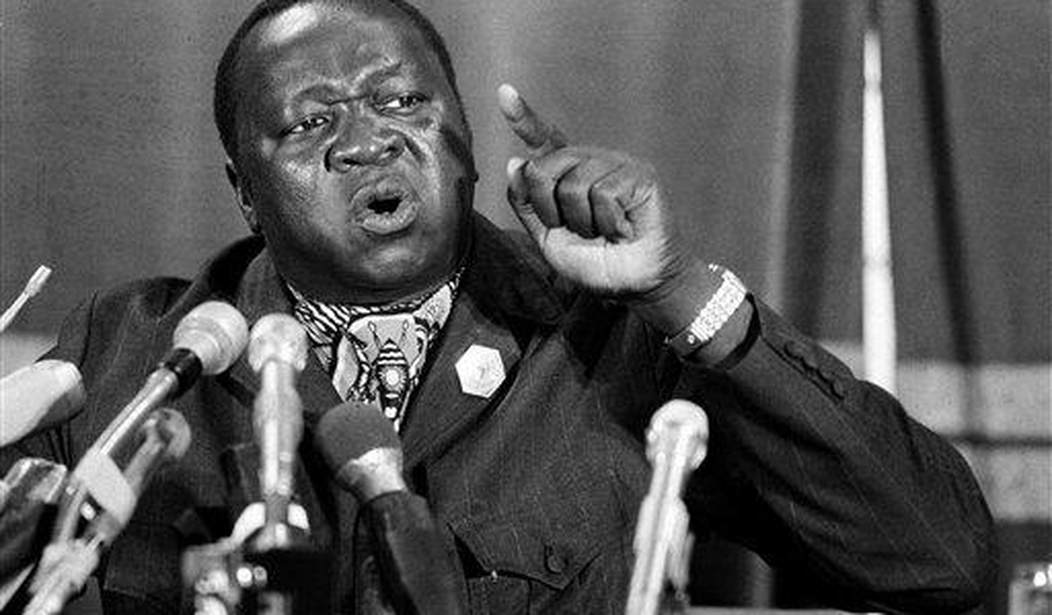We all know about July 4 and the amazing miracle that happened on this date 248 years ago in Philadelphia. Bur some of us are old enough to remember another July 4 miracle that happened not in 1776, but in 1976. It was not in Pennsylvania but in Uganda, and it's something we should all be aware of in this world of hostages today.
On June 27, 1976, an Air France flight left Tel Aviv with 246 passengers and a crew of 12. It stopped in Athens to pick up 58 more passengers... and four hijackers: 2 Palestinians from the PFLP and two from the German Revolutionary cells. They hijacked the plane to refuel in Benghazi, Libya, and then continued to their destination of Entebbe Airport in Uganda, where they arrived on June 28. Four other hijackers joined them at Entebbe, where they were also supported by the forces of Ugandan President Idi Amin Dada, who personally visited the hostages on a daily basis. The hijackers’ demands were for both money and the release of 53 Palestinian terrorists, 40 of whom were in Israeli prisons. They promised to start killing hostages on July 1 if their demands were not met. On June 30, 48 non-Israeli passengers who were mostly old and sick were released. This made it even clearer that this was a Palestinian way of attacking Israel: to kidnap Israeli civilians.
On July 1, Israel said they would negotiate, and the Palestinians postponed executing innocents until noon on July 4, and released the remaining 100 non-Israeli hostages. Now 106 hostages remained at Entebbe, which included the brave Air France crew who refused to leave.
From the moment the plane had been hijacked, Israel tried to negotiate for the release of the hostages, attempting to use Anwar Sadat of Egypt and even reaching out for help from Yasser Arafat. But it was to no avail. In Israel, the internal fight was over whether to give in to the terrorists' demands or not. Yitzhak Rabin wanted to capitulate and just get hostages back, while Shimon Peres believed that if Israel did that, it would portend a future of Palestinians kidnapping Israelis as a war tactic.
Faced with failing negotiations and realizing that a precedent of succumbing to terrorists could be devastating to Israel in the future, a military rescue mission was planned.
One of the challenges for Israel was aircraft fuel. The Israelis would need to refuel the C130 Hercules aircraft somewhere between Israel and Uganda, and it secured permission from President Jomo Kenyatta to do so in Nairobi. A total force of 100 personnel would be involved in the operation. A crucial element to success were the 29 members of the assault unit, led by Lt. Colonel Yonatan Netanyahu (the brother of current Prime Minister Benjamin Netanyahu), who would need to assault the old terminal where the hostages were being held and rescue the hostages. Paratroopers would secure the entire airport; the Golani brigade would secure the Hercules aircraft; and Major Shaul Mofaz would lead the team that would clear the military airstrip and destroy the MIG fighters there.
Perfect coordination would be needed and every piece would have to fall exactly into place for the hostages to be rescued successfully.
Israeli forces landed on July 3 at 11:00pm. They traveled to the hangar in a motorcade designed to look like Idi Amin's. When the Israelis got into the hangar where the hostages were being held, they identified themselves in Hebrew and English and yelled for everyone to stay down. Three hostages either didn't understand or didn't listen, raised their heads, and were killed by crossfire. The hijackers were killed, and the hostages were rushed to the Israeli aircraft but were attacked by Ugandan soldiers on the way, some of whom were in the control tower. Five commandos were wounded in the firefight, and Colonel Netanyahu was killed. But the hostages got to the plane, and once Netanyahu's body was carried on to it, the plane took off to Nairobi.
The entire operation lasted 53 minutes. All seven hijackers present at the airport, and between 45 and 45 Ugandan soldiers, were killed. Of the 106 hostages, three were killed, one was left in Uganda (a woman who had been taken from the airport to a hospital on June 29), and ten were wounded.
On July 9, the United Nations convened to condemn Israel for the attack. But thanks to the strength of Britain and the United States, no official resolution was passed. Europe and America were unified in condemning the terrorists, and effusively praised Israel for her strong actions, swift and decisive response, and for not surrendering to terrorists.
But as we have seen since Oct 7, that Western support for decisive action agsinst evil that existed in 1976 has been replaced with a sympathy for the terrorists today. Praise for Israel as a defender of freedom has been transformed over the last 48 years into an overt anti-Israel hatred of Jews worldwide. Commitment has been replaced by capitulation.
America's Founding Fathers courageously acted on their faith and dedication to freedom 248 years ago with the Declaration of Independence. Israelis acted with that same commitment to protect freedom 48 years ago today in Entebbe. We all need to emulate their courage and commitment in every aspect of our lives by being and acting as proud Americans every day.
This story needs to be remembered today, both because of the July 4 anniversary and because of what has happened since Oct. 7. We need to take the lessons of 1776, 1976, and today. Through remembering history, may we all find a path to a safe peace for us all in these challenging days.
Happy 4th of July.










Join the conversation as a VIP Member